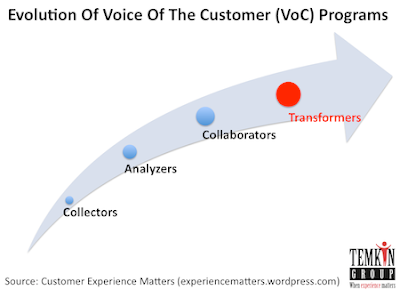Can a company truly transform itself into a premier service organization, or must the company be "born" with that as its central mission?
It is easy to find examples of companies that make service excellence "the" key competitive dimension--think Zappos, Ritz, and JetBlue. But the question is whether these companies began ascendancy as premier organizations, or were transformed into premier organizations as a result of changes to a failed business strategy.
Bruce Temkin of the Temkin Group talks about Customer Experience maturity in a recent post in his blog Customer Experience Matters. http://experiencematters.wordpress.com/2010/05/19/how-voice-of-the-customer-programs-evolve/ He cites four stages of company evolution:
- Collectors--company focuses on getting the right data.
- Analyzers--company focuses on uncovering insights from the data.
- Collaborators--data insights are used to help departments understand issues, help continuous improvement efforts.
- Transformers--data insights are linked into most departments operations and strategy.
Bruce estimates that 40% of companies trying to create a premier customer experience are in the Collector stage, 40% are in the Analyzer stage, 18% are Collaborating, and only 2% are actually Transforming.

What does this say? It says that although many companies are indicating they want to invest in delivering premier customer service, few are getting any benefit from their efforts. Only 20% are getting the customer's voice into their decision making, and only 1 in 50 companies are actually making the customer central to their operations and strategy.
Since there are companies that are truly Customer-centric in their approach, this begs the question: did these companies follow the steps that Temkin outlines, or did they grow up already transformed. Can companies evolve?
My View:
Ouch! This data further confirms my belief that senior management in many companies are saying the words (80% of companies say they want to compete based on superior customer experiences) but are not doing what is necessary to get there. This strategic positioning runs the risk of being a "thing"--something all companies have to say because it is fashionable to do so--rather than a substantive business initiative.
Many companies that are the benchmarks for premier service have benefitted in terms of marketshare from that positioning, and have grown profitably as a result. Without knowing the companies Temkin has listed in the 2%, my bet is that many of them have grown up as "transformers."
Does this mean that if your company is in the middle of the service experience pack today that it cannot differentiate itself in the future? Not at all. But the executive "rubber meets the road" work begins when the company has gathered data and gained insight. The executive needs to make critical organizational changes that features that data, improves customer experience based on that data, and makes business priorities using the voice of the customer. In short, the executive needs to believe in the strategy and the data, and drive the company.
Without that, the company will never evolve and reach tranformative stages. Most will not. Enlightened and focused companies can.
